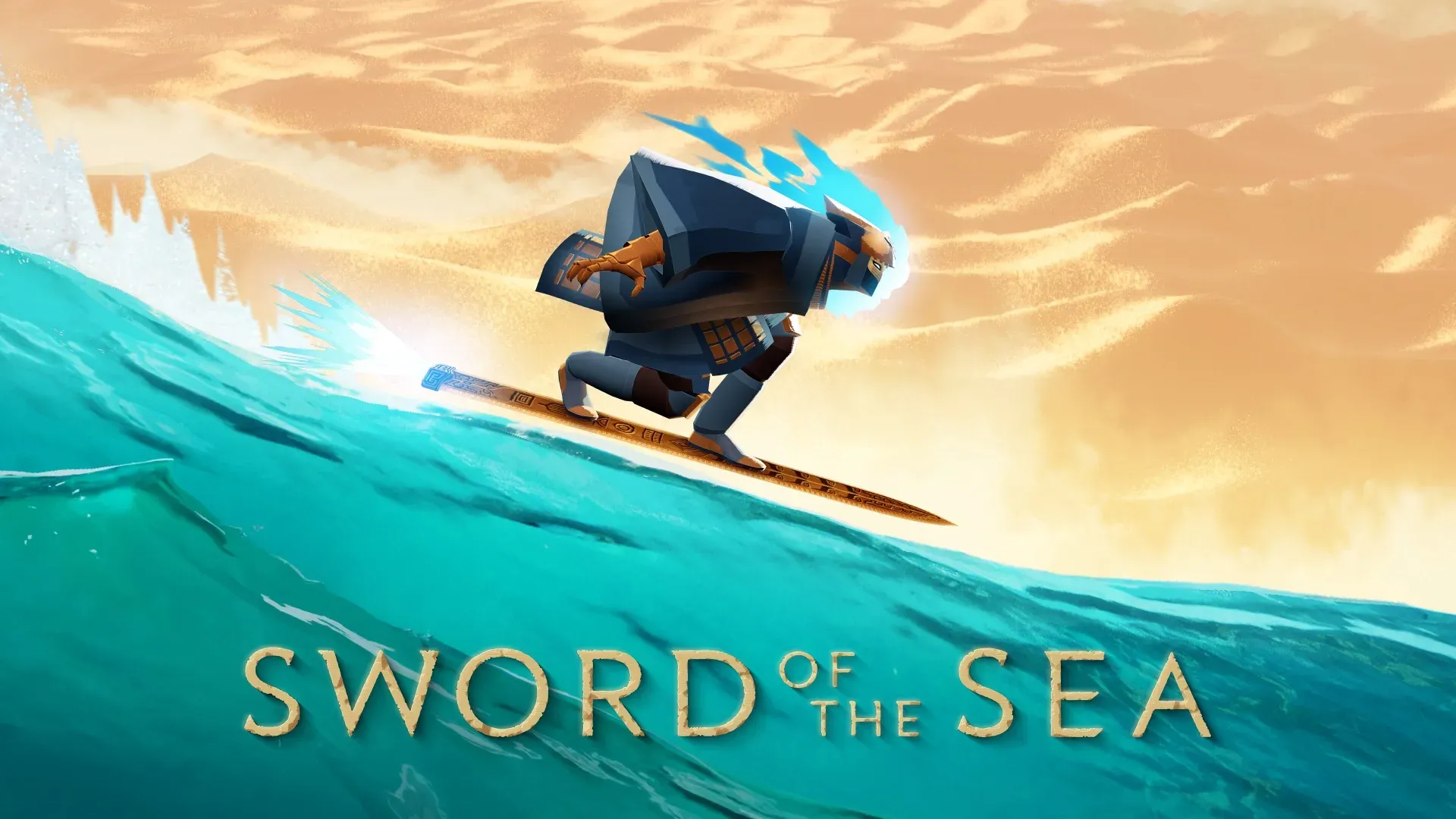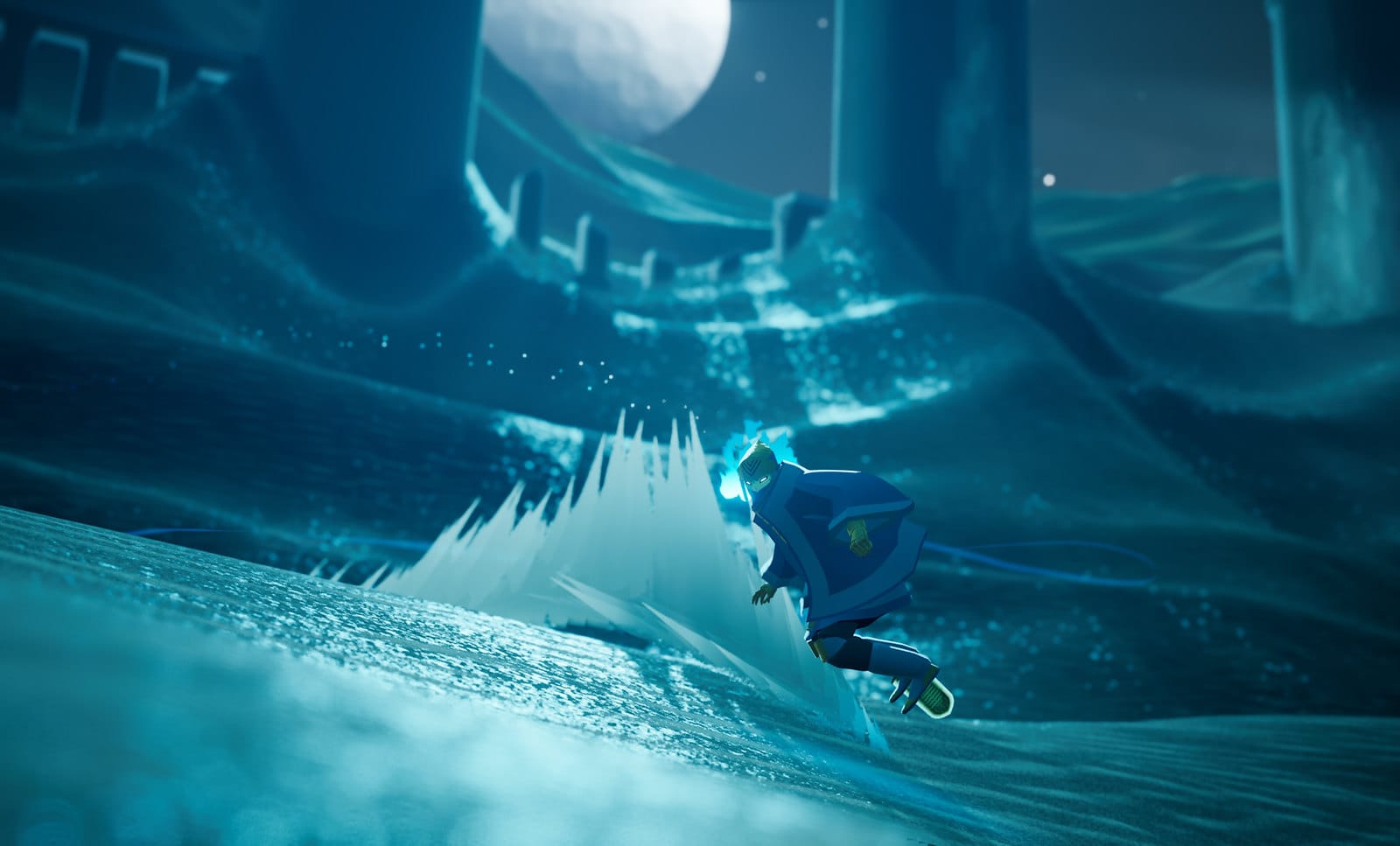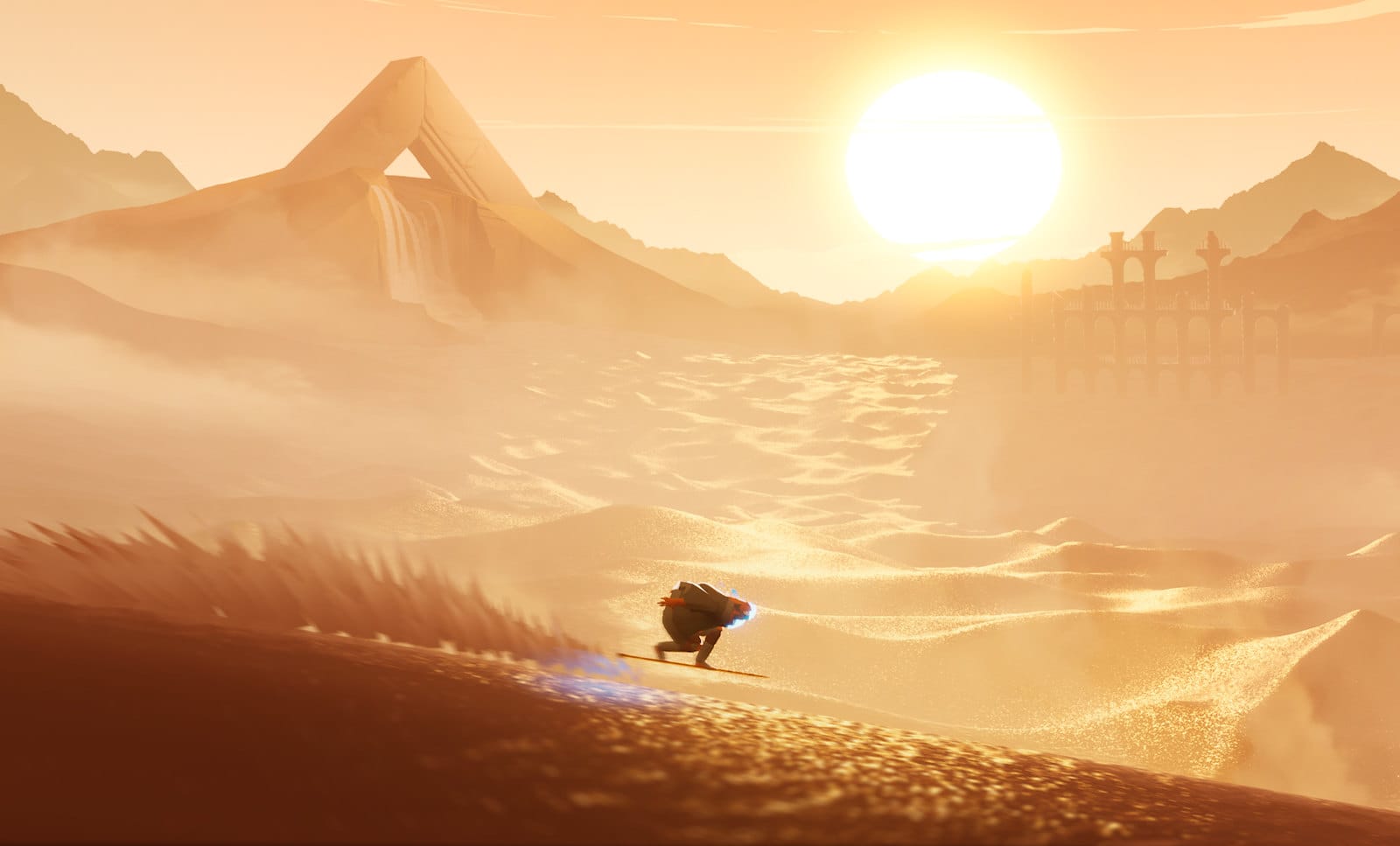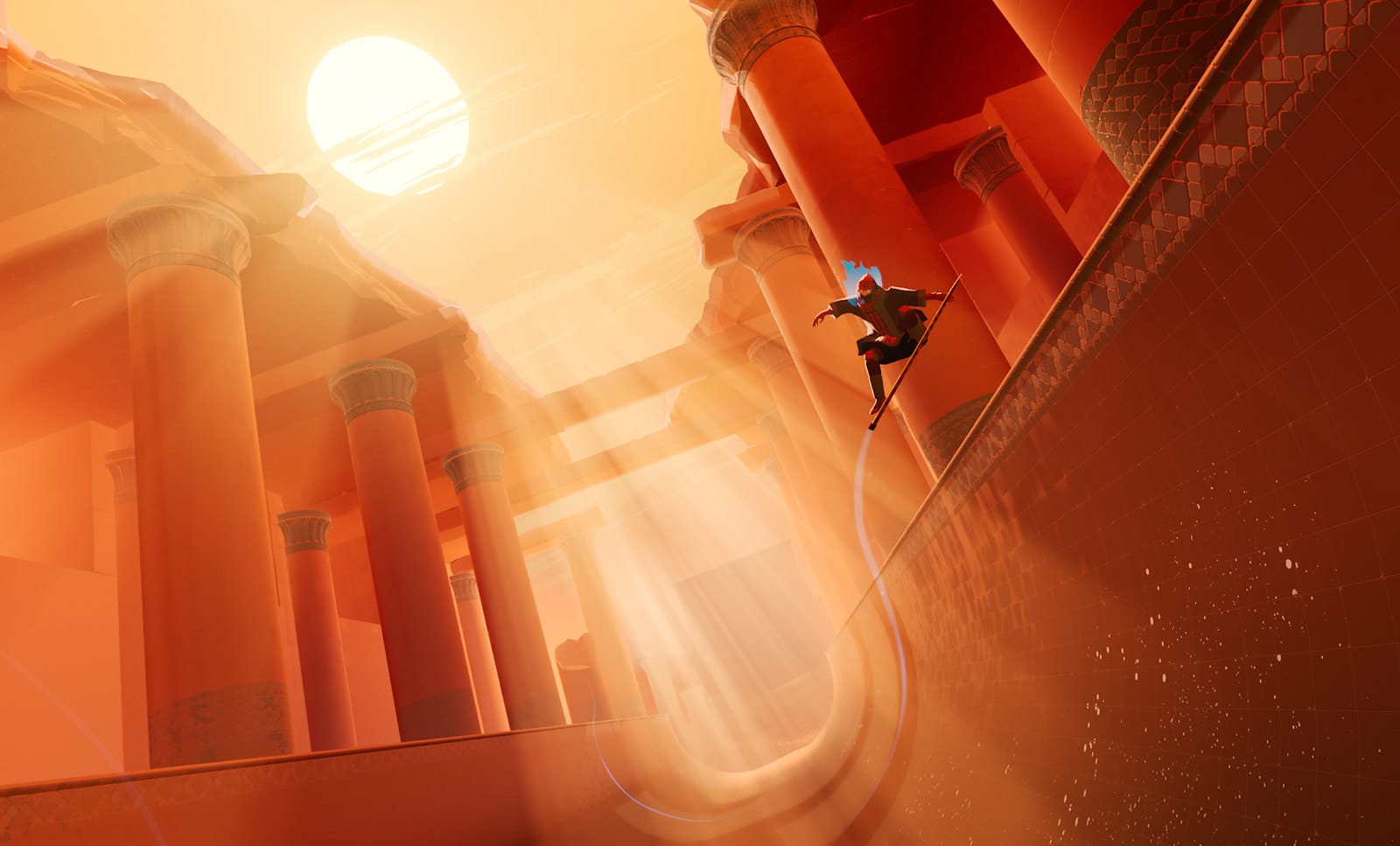Sword of the Sea Is Pure Art
Riding the beautiful waves

There aren’t any other media where we can quite experience something as profound as Sword of the Sea. It is a form of beautiful art that we are lucky to call a piece of gaming. It exemplifies what makes gaming unique amongst other media, and why I love this medium so dearly. Sword of the Sea is one of these games, striving to be not just a game but an experience as well. Created by developer Giant Squid (who also created Abzû and The Pathless), it feels very much like a spiritual successor to both Journey and Abzû, but Sword of the Sea is worthy in its own right of being labeled as gaming art in its purest form. I cannot gush enough about how much I love games of this sort. Abzû and Journey were both gems in their own right, yet it feels as if the studio knew how to take this genre to new heights.
These types of experiences aren't for everyone, as they do not set out to be video games first and foremost; rather, they seek to provide you with an artistic experience in the form of a game. There isn’t anything I can particularly say to sway those who do not gel with this type of game. That is also something Sword of the Sea really homes in on for me, the idea that our chosen hobby of gaming could be so varied and vast that an experience like this can coexist alongside things like Dark Souls, Mario, or Xenoblade, for instance.
I want to express that primarily because I feel as if games such as Sword of the Sea are important. They’re proof of artistic expression in gaming as a whole, and I hope more indie developers and small studios will explore games like this. Nomada Studio's Neva comes to mind, as well as Giant Squid’s PS5 release window title, The Pathless, though I've yet to play that one.
Journey, I have to add, wasn't made by Giant Squid, but the founder of the studio was the Art Director for Journey, and the music for both games was done by the incomparable Austin Wintory, so there is significant inspirational carryover between the two. It is clear they inherited much of Journey’s DNA while making Abzû, and subsequently, from both games while making Sword of the Sea. Hence why I must say in advance that I can’t help making comparisons, but know that it comes from a place of genuine love for all three games.

As is the case with Abzû and Journey, Sword of the Sea features a silent protagonist called Wraith, and the game contains no dialogue whatsoever. You’ll find Wraith sets out on a journey upon his awakening to restore the ocean from a dry and arid desert. They’ll activate runestones that bring the oceans back into existence. Wraith travels by surfing on a sword, dashing through sand dunes, and more on his quest to restore the seas. There’s your general synopsis.
I can do my best to describe the things you’ll see on Wraith’s journey, such as his eventual companion named The Wanderer, but no matter how much I put into writing about Sword of the Sea’s beautiful world, it wouldn’t do it justice. This is a game you must experience for yourself.
The surfing controls very smoothly, much more than you might expect. It’s not too complex, as you merely use the left stick of your controller to move about, hitting a button to jump as needed as well. It is very oddly relaxing, more so than Journey or Abzû ever was. Journey was intent on creating a different experience, one that is more lonely and melancholy than its spiritual successors. Abzû’s water-bound controls were prone to veer off at times and became a bit stiff to use while turning. That is not the case with Sword of the Sea, as it handles beautifully for the most part. When tight jumps are needed, you’ll find the momentum of the surfing does occasionally cause some errors, but it nonetheless works great.
Puzzles are placed intermittently throughout the game, though I use the term “puzzle” very loosely. The extent of these is merely surfing around or jumping with some light platforming to reach a runestone you’ll activate with the hit of a button. A few puzzles require you to carry a water bubble without popping it, which aren't hard to clear your way through either. I have to admit I was rather unenthused by the segments where you ride a sea creature, such as a dolphin, and ram into crystals to progress. This particular mechanic didn't feel great to play, though fortunately, these segments didn’t last long. I'm glad Sword of the Sea respects the player’s time, for much of this level design would’ve grown repetitive, despite the beautiful atmosphere, if the game were much longer.

I was also rather confused at the inclusion of a collectable currency in the game, much like the ones you’d find in retro 3D platformers. You’ll be able to invest these funds at merchants to unlock extra abilities for Wraith, but these abilities don’t really affect gameplay, for better or worse. For the better, this doesn’t force you to go around collecting currency in order to progress at all, but on the other hand these abilities then have to be optional. In a game where the controls are nothing more than surfing and jumping, what could these unlockable abilities really be? The ones I was able to grab were merely the ability to do mid-air tricks to increase your score.
There are also timed challenges where you attempt to achieve a high score. I assume the score is tied to a Trophy or Achievement of some sort, but I couldn’t help wondering what the point was. Sword of the Sea felt like such a deliberately crafted artistic game that these “game-y” mechanics don’t really give the sense that they belong here. They unfortunately feel very tacked on, and I’m not entirely sure they needed to be in the game at all. I ignored them for the most part and still adored my time with Sword of the Sea.
With the choice to feature no dialogue in the game, visual storytelling is left to carry the weight of the narrative. There is a tiny bit of written lore here, in the form of small stones with engravings you find throughout the journey, offering some vague droplets of background information. It’s a welcome shift from Giant Squid’s previous work, which was even more vague. I am of the mind that stories that don’t spell every little detail out are actually to the benefit of the overall narrative. However, I also believe there is a fine line to cross where you run the risk of being too vague. You want your player to come up with their own interpretations, but you also don’t want them coming away wondering what in the world your game was even about. Although Giant Squid’s previous work did not need written lore bits in my mind, they handle it well enough here by still keeping it vague to a point where it neither hurts nor harms the game from its inclusion, and helps build this world further.
Structurally speaking, Sword of the Sea shares a lot with Giant Squid’s previous work. The protagonist proceeds on his journey until they inevitably hit a challenging threat that almost kills them, only to power through and take it head-on. I admit I was a bit disappointed to find that the game reused this structure, for it was what held Abzû back for me. However, Sword of the Sea has its own unique messaging and themes that help circumvent my disappointment from Abzû. No, it doesn’t reinvent the wheel, but it retools it just enough that it stands on its own in a way that still shines. I personally find Journey to be the most resonant game for me still; there was something about the lonely melancholy present throughout that title that was just hauntingly beautiful. Sword of the Sea captures some of that at times, and it is partly why I’d say it impressed me.

Of course, the visuals in general are stunningly beautiful; the sand dunes really pop, and feel as if you can run your hand across them to see the ripple effect while Wraith surfs over them. Fish that emerge and float around whenever parts of the sea are restored, and you can admire the sea life beneath the newly formed waves as well. The way the land pulsates and fluctuates really invokes the idea that the ocean is right beneath the land you’re surfing over. Even as you progress into more varied landscapes, snowy vistas here and magma there, you’ll notice the ground has the same effect. It fits the theme of the game, the ocean beneath the surface that has been conquered by the land above.
The sound design is lovely, especially the music. Austin Wintory, you’ve done it again, you brilliant man. Renowned for his work as a composer on Journey as well as Abzû, Wintory is remarkably magnificent yet again here. The game's atmosphere is really built from this soundtrack, the music hitting those large swells you want it to in the right moments. Those times when you enter a vast landscape after surfing through a long section, admiring the beauty before you while the music crescendos; there’s nothing really like it.
I was also surprised to hear the vocals in the music from a voice I actually recognize! Malukah does the vocals here, which is a name you may know from her gaming song covers on YouTube for games like Skyrim. She also very notably did several songs for the Call of Duty Zombies series, including the beloved “Where Are We Going”. I recognized her voice almost immediately and confirmed with a search that it was indeed her, so hearing her do more game work really made me smile.

Even with the joy I found in the game, I can't escape the sadness of how rough the games industry is right now. There’s a real possibility that other experiences like Sword of the Sea may not ever get made. In an interview, Matt Nava admitted as much.
“It has been rocky for sure, and there’s definitely been moments where we’re like, are we gonna make it, you know? But we’ve had some really fantastic partners over at PlayStation Indies program who believed in this project from the very beginning and when times got tough they came in and they saved us."
While I'm happy PlayStation’s PS Plus program saved this game and its studio, I’m very disturbed that the world could be robbed of art like this due to the industry's continuing volatility. It’s incredibly heartbreaking to me that a game as beautiful as Sword of the Sea almost didn’t make it out of the door without a major publisher striking a deal with them. How many other games may not see the light of day without that type of backing? What would those games have been like? We'd never know.
Please, I am imploring all of you reading this, give the game a shot on your own volition. Open your heart to this kind of experience if you haven’t tried this type of game before. It’s special in its own right, and I think gaming as a whole is much better when we have unique experiences like this. We need games where we can say, “I’m glad this exists. I’m happy someone made this. I hope they were at peace with what they put out into the world.” For me, it provides a very meditative experience that I really needed right now, so I felt an immense connection while playing.
Sword of the Sea’s messaging is open to interpretation, of course, but I feel it resonates as commentary on climate change, especially on how our oceans are being neglected. This world you explore is devoid of life, but with every piece of ocean restored comes healing. This world can be healed so long as we fight to do so. There is so much beauty in the world that we’re losing over time. That doesn’t only stem from climate change, but perhaps in general as well. I brought this up even in my review of Hypnospace Outlaw, where I noted that even the internet itself has lost so much of its color and vibrancy since the 90s. The message behind Sword of the Sea isn’t the most complicated thing you’ll ever hear. It’s not complex or perhaps even thought-provoking.
What it is, however, is something we all need to be reminded of, and that’s a more valuable message than any new release I've played in 2025. It’s more valuable to people as a whole, a sobering reminder that we belong on this planet, regardless of how everlastingly ominous the future may appear. Sword of the Sea is a reminder of that, and I cannot recommend it enough.
